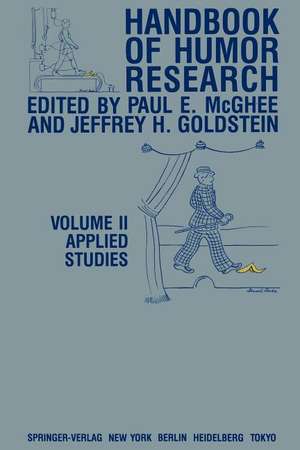Handbook of Humor Research: Volume II: Applied Studies
Editat de P. E. McGhee, J. H. Goldsteinen Limba Engleză Paperback – 8 noi 2011
| Toate formatele și edițiile | Preț | Express |
|---|---|---|
| Paperback (2) | 723.69 lei 6-8 săpt. | |
| Springer – 8 noi 2011 | 723.69 lei 6-8 săpt. | |
| Springer – 9 oct 2011 | 725.43 lei 6-8 săpt. |
Preț: 723.69 lei
Preț vechi: 882.55 lei
-18% Nou
Puncte Express: 1086
Preț estimativ în valută:
138.52€ • 150.52$ • 116.43£
138.52€ • 150.52$ • 116.43£
Carte tipărită la comandă
Livrare economică 21 aprilie-05 mai
Preluare comenzi: 021 569.72.76
Specificații
ISBN-13: 9781461382386
ISBN-10: 1461382386
Pagini: 232
Ilustrații: 215 p.
Dimensiuni: 155 x 235 x 12 mm
Greutate: 0.33 kg
Ediția:Softcover reprint of the original 1st ed. 1983
Editura: Springer
Colecția Springer
Locul publicării:New York, NY, United States
ISBN-10: 1461382386
Pagini: 232
Ilustrații: 215 p.
Dimensiuni: 155 x 235 x 12 mm
Greutate: 0.33 kg
Ediția:Softcover reprint of the original 1st ed. 1983
Editura: Springer
Colecția Springer
Locul publicării:New York, NY, United States
Public țintă
ResearchCuprins
1 How to Get More Smileage Out of Your Life: Making Sense of Humor, Then Serving It.- 2 From the Sublime to the Ridiculous—the Religion of Humor.- 3 Comic Creativity in Plays, Films, and Jokes.- 4 Personality and Psychopathology in the Comic.- 5 Humor in Psychotherapy: Past Outlooks, Present Status, and Future Frontiers.- 6 Pathological Disorders of Laughter.- 7 Humor and Health.- 8 Humor and Popular Culture.- 9 Humor in the Mass Media.- 10 Uses and Effects of Humor in Educational Ventures.- Author Index.
Descriere
Descriere de la o altă ediție sau format:
About a decade ago we edited The Psychology of Humor. Besides the summary chapter and bibliography of about 400 items, the book contained eleven original papers that represented the state of knowledge at that time. We confess that it was not easy to fill that volume with first-rate contributions. In a few instances we invited contributors only on the basis of having heard through the grapevine that they were doing interesting work on humor. Our sources proved reliable and we were pleased with the results. We even made new friends as a result of these blind invitations. But the fact remains that in the early 1970s there was only a handful of social scientists studying humor and laughter. The history of humor research prior to the 1970s can also be characterized in terms of the short-term commitment to investigating humor among those who did venture out and try their hand at designing humor studies. For reasons that remain unclear, many investigators published only one or two humor studies before abandoning the area in favor of some other research domain. We have the impression that for decades social scientists have been very intrigued by the idea of studying humor. Psychologists have suspected for a long time that humor somehow is very important in the lives of people. We find laughter and humor occurring almost wherever we find people engaged in social interaction.
About a decade ago we edited The Psychology of Humor. Besides the summary chapter and bibliography of about 400 items, the book contained eleven original papers that represented the state of knowledge at that time. We confess that it was not easy to fill that volume with first-rate contributions. In a few instances we invited contributors only on the basis of having heard through the grapevine that they were doing interesting work on humor. Our sources proved reliable and we were pleased with the results. We even made new friends as a result of these blind invitations. But the fact remains that in the early 1970s there was only a handful of social scientists studying humor and laughter. The history of humor research prior to the 1970s can also be characterized in terms of the short-term commitment to investigating humor among those who did venture out and try their hand at designing humor studies. For reasons that remain unclear, many investigators published only one or two humor studies before abandoning the area in favor of some other research domain. We have the impression that for decades social scientists have been very intrigued by the idea of studying humor. Psychologists have suspected for a long time that humor somehow is very important in the lives of people. We find laughter and humor occurring almost wherever we find people engaged in social interaction.
















